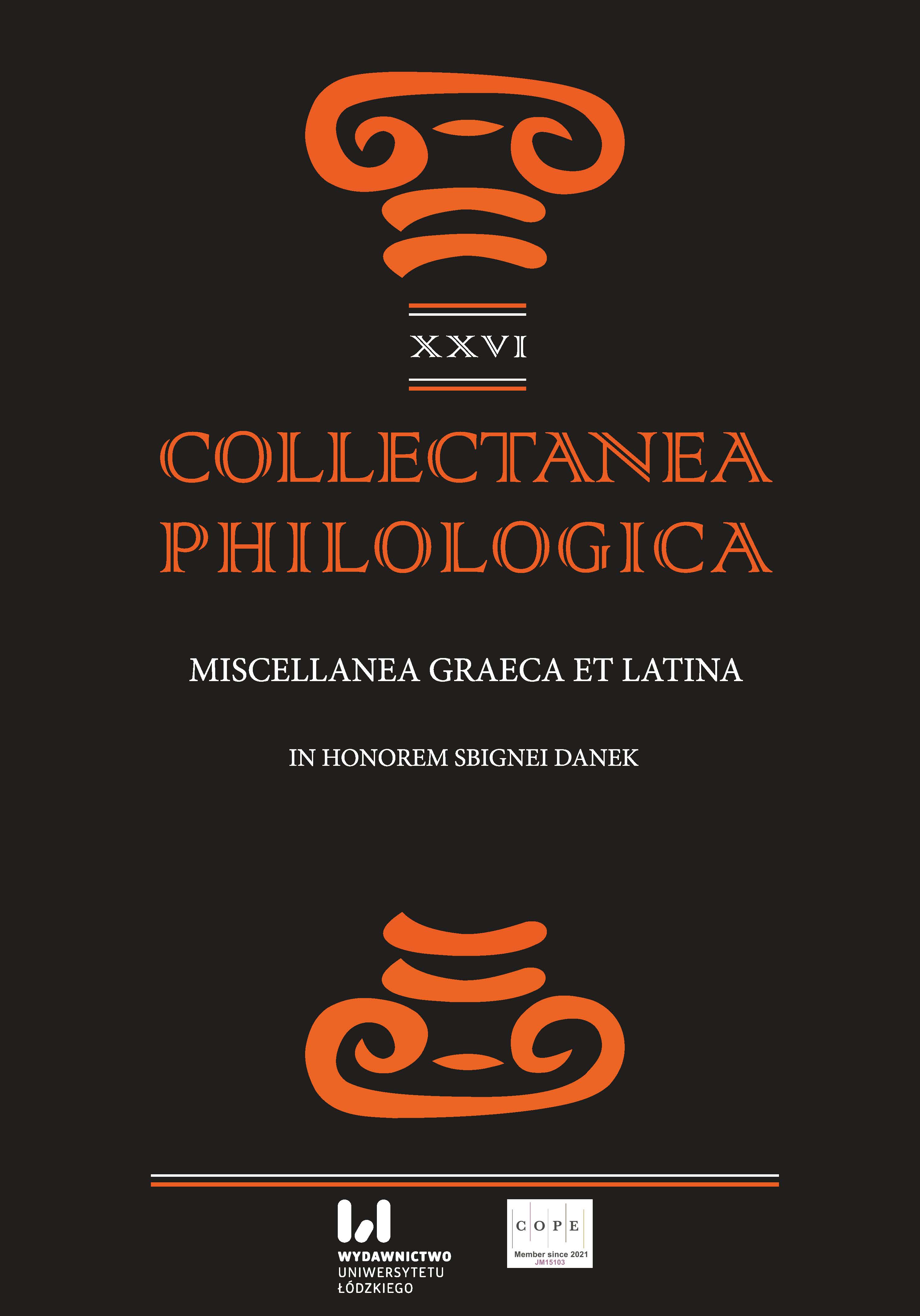Augustyn i Jan Kasjan o dopuszczalności kłamstwa, które jest bezwzględnym grzechem
DOI:
https://doi.org/10.18778/1733-0319.26.14Słowa kluczowe:
Augustyn, Jan Kasjan, kłamstwoAbstrakt
The author of the article analyzes the similarities and differences in Augustine’s and John Cassian’s approaches to both the nature of lying as a sin and its possible permissibility or at least its pardonability in strictly defined situations. He argues for the position that it is impossible to say unequivocally whether Cassian undertook a conscious polemic with the Bishop of Hippo on this issue or even whether he was at all familiar with both or any of his treatises on lying. The fundamental difference between them regarding the issue of accepting intentionality in committing this absolute sin stems from the nature of the writings in which they articulated their views, their rhetorical context and the anthropological perspective of both authors.
Bibliografia
Augustinus. (1895, CSEL, 34,1); (1898, CSEL, 34,2); (1904, CSEL, 44), (1911, CSEL, 57). Epistulae. A. Goldbacher (ed.). Vienna. Corpus Christianorum Ecclesiasticorum Latinorum.
Google Scholar
Augustinus. (1900). Contra mendacium liber unus. J. Zycha (ed.). Vienna. Corpus Christianorum Ecclesiasticorum Latinorum 41. 469–528.
Google Scholar
Augustinus. (1900). De mendacio liber unus. J. Zycha (ed.). Vienna. Corpus Christianorum Ecclesiasticorum Latinorum 41. 413–466.
Google Scholar
Augustinus. (1971). Expositio epistulae ad Galatas liber unus. Vienna. Corpus Christianorum Ecclesiasticorum Latinorum 88. 55–141.
Google Scholar
Augustinus. (1981). Epistolae ex duobus codicibus nuper in lucem prolatae. J. Divjak (ed.). Vienna. Corpus Christianorum Ecclesiasticorum Latinorum 88.
Google Scholar
Augustinus. (1984). Retractationum libri duo. A. Mutzenbecher (ed.). Turnhout. Corpus Christianorum. Series Latina 57.
Google Scholar
Hilarius Pictaviensis. (1891). Tractatus super Psalmos. A. Zingerle (ed.). Vienna. Corpus Christianorum Ecclesiasticorum Latinorum 22.
Google Scholar
Ioannes Cassianus. (1886). Collationes Patrum. M. Petschenig (ed.). Vienna. Corpus Christianorum Ecclesiasticorum Latinorum 13.
Google Scholar
Ioannes Cassianus. (2004). De institutis coenobiorum. G. Kreutz (ed.). Vienna. Corpus Christianorum Ecclesiasticorum Latinorum 17.
Google Scholar
Prosperus Aquitanus. Liber contra collatorem. Patrologia Latina 51. 215–276.
Google Scholar
Brown, P. (1988). The Body and Society. Men, Women and Sexual Renunciation in Early Christianity. New York: Columbia University Press.
Google Scholar
Cassiday, A. (2007). Tradition and Theology in St. John Cassian. Oxford: Oxford University Press. https://doi.org/10.1093/acprof:oso/9780199297184.001.0001
Google Scholar
DOI: https://doi.org/10.1093/acprof:oso/9780199297184.001.0001
Chadwick, O. (1950). John Cassian. A Study of Primitive Monasticism. Cambridge: Cambridge University Press.
Google Scholar
Feehan, T. (1990). “The Morality of Lying in St. Augustine”. Augustinian Studies 21. 67–81. https://doi.org/10.5840/augstudies1990213
Google Scholar
DOI: https://doi.org/10.5840/augstudies1990213
Fleming, J. (1998). “By Coincidence or Design? Cassian’s Disagreement with Augustine Concerning the Ethics of Falsehood”. Augustinian Studies 29(2). 19–34. https://doi.org/10.5840/augstudies199829220
Google Scholar
DOI: https://doi.org/10.5840/augstudies199829220
Goliński, Z. (1936). „Nauka Jana Kasjana o kłamstwie użytecznym”. Collectanea Theologica 17(4). 491–503.
Google Scholar
Graminga, R. (2020). Augustine’s theory of signs, signification, and lying. Berlin, Boston: De Gruyter. https://doi.org/10.1515/9783110596625
Google Scholar
DOI: https://doi.org/10.1515/9783110596625
Griffiths, P.J. (2004). Lying. An Augustinian Theology of Duplicity. Grand Rapids: Brazos Press.
Google Scholar
Markus, R. (1990). The End of Ancient Christianity. Cambridge: Cambridge University Press. https://doi.org/10.1017/CBO9781139167949
Google Scholar
DOI: https://doi.org/10.1017/CBO9781139167949
Ramsey, B. (1985). “Two Traditions on Lying and Deception in the Ancient Church”. The Thomist 49. 504–533. https://doi.org/10.1353/THO.1985.0001
Google Scholar
DOI: https://doi.org/10.1353/tho.1985.0001
Ramsey, B. (1993). “John Cassian: Student of Augustine”. Cistercian Studies 28(1–2). 5–15.
Google Scholar
Opublikowane
Jak cytować
Numer
Dział
Licencja

Utwór dostępny jest na licencji Creative Commons Uznanie autorstwa – Użycie niekomercyjne – Bez utworów zależnych 4.0 Międzynarodowe.












